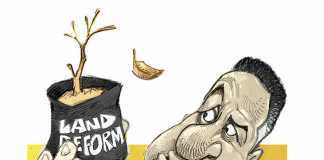Farmers often become demoralised when thinking about black economic empowerment and land reform. But we shouldn’t lose perspective. Creating a balance sheet will show that there are still more positive than negative dimensions in our lives. The South African economy is growing faster than ever before. Consumer trust is rising, resulting in sales and investment growth; and things are looking up for most of the agricultural sectors. Consider the positive effects of empowerment and higher minimum wages – by giving people more money we create a stronger middle class.
As a result more people are able to buy fruit and other produce. Increased earnings and living conditions foster better education of children, which helps to raise our country’s civilisation plane. It will ultimately result in a higher level of skills and expertise in the country, something that South Africa is in desperate need of at the moment. Look on the bright side, we should appreciate South Africa’s peace and stability. Inflation is under control. We are not Zimbabwe.
We have won the 2010 Soccer World Cup – just think of the opportunities this event will bring to our country. It will stimulate our tourism industry and increase our consumer market. Last year alone tourism to South Africa increased by one million people.
Soul of a farmer
Our predecessors did not have it as easy as we do today. They battled through droughts, depression and wars – land was also taken from many of them. And look at how they started farming – they had to dig their own water canals and build their own houses. They did not have access to the technology and implements we have today. They’d stay in small wooden houses and build a room when they could afford it. Yet room by room, the house would expand into one of the beautiful old H-shaped Dutch houses that we still see on many of the old farms today.
This ability to dream and build a future out of nothing is what makes a farmer different from other people. A farmer is a specimen who lives for tomorrow and he is always optimistic. When it is dry he says, “it will rain tomorrow.” And if there’s a flood, he is excited about the beautiful new orchard he’ll establish. He has to be creative and innovative to address all the problems that nature, the market and whatever else can throw his way.
A mindshift
So, let’s pull ourselves together and make a mindshift. Our problems are not unique. The same is happening in America, Australia, France and Spain. Land symbolises power and poor people want their own land. We can accept and manage this desire – or we can ignore it. By ignoring it, we make ourselves vulnerable. If we don’t take charge of our future, then somebody else will do it for us and their decisions might not be in our best interests. It is better to be in charge of your own ship and have some control over where you end up. Alternatively, we can sell our land and live in small houses in town; or we can emigrate.
All farmers know, however, that farming is in the blood. If you were born to farm, then moving to town is not an option. Emigrating to farm in another country might not be the solution either. Most farmers in other countries are confronted with problems and let’s be honest, how many immigrants do we know who are really happy overseas?
So how can we manage land reform?
If there were a claim against your land, it would be best to get an expert legal advisor who specialises in land claims to negotiate for you. Taking the matter to court would probably get the same result as negotiating a price with government. Get a good deal, take the money and get on with your life. There is nothing we can do about it – it is the law. The bottom line is that you need good legal advice to ensure you get a fair deal. Don’t let uncertainty about the AgriBEE draft deter you.
Everybody is still in the dark concerning what the final draft will look like. In the meantime, while we’re waiting, enjoy your farm, work the land until you know what is expected of you and then you can decide how you want to move on: do the best you can with what you have. And start to empower your people. You can start small, like our predecessors: build one new room at a time. But do something. Join hands with other producers and organisations and find innovative ways to practice sustainable empowerment. Empower your workers, so they will share in your success. And that instigator who is causing so many problems – get him on your side. He will shout just as loudly for you if you win him over. If times are difficult walk slower, but don’t stop. Move in the right direction. Nobody can do more than his best.
Resolving labour problems
Remember that labour problems are an intrinsic part of almost any industry. They’re like water problems or increased taxes – you have to manage them. As a farmer you need to spend time working out strategies to reduce conflict and create an environment that isn’t conducive to labour problems. Spend time creating strategies to address problems before they arise. Know your rights and your workers’ rights. And then, if you need to dismiss someone, do it through the right channels. It is not worth losing your whole future, because you got angry and did something irresponsible to a worker. Something also needs to be done about the negative image of farmers. We need to market ourselves and tell the world about the good things we do – nobody’s going to do it for us. We also have to start talking about the successes of black commercial and emerging farmers instead of focusing on failures. The success of land reform will have a huge impact on our futures in this country and it is in our best interest that these projects succeed.
Therefore, instead of criticising, get involved. We have to decide whether land reform and black economic empowerment are going to be stumbling blocks or stepping stones. We need to get on top of these issues and use them to mediate our future. We need to detach ourselves from our emotions and see things in perspective. We are a minority group in this country. It’s normal to want a better lifestyle and future, but we will have to share – there is no other choice. Life is like a ladder and nobody ever climbed a ladder with their hands in their pockets. Like the old sailors we have to leave what we know and sail into the unknown, in search of a better future for all of us.













